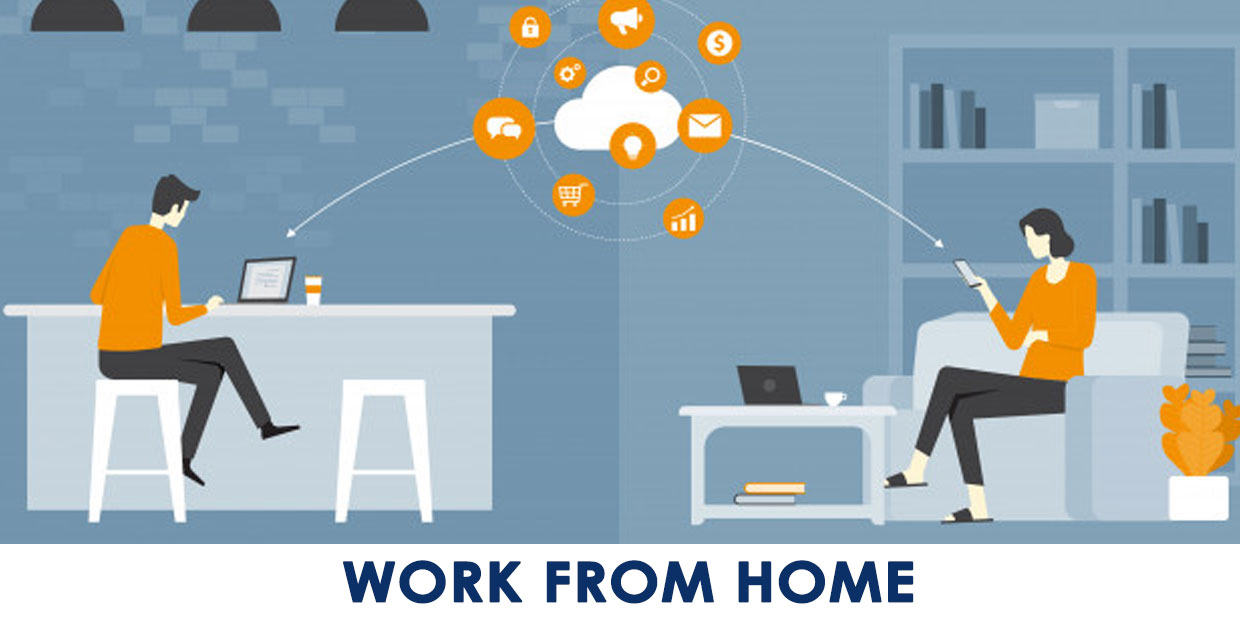
“Before you start your daily work from home, talk to your boss on’s phone for five minutes. Have clear-cut targets for the day.” Says Prof Rajat Bohra of Taxila Business School, Jaipur, who also studies remote working.
Most of the companies around the world have started rolling out compulsory remote working schemes to promote social distancing to stop the Covid-19 spread.
Most people spend their days in proximity to their boss, meaning communication is easy and effortless. Your manager might not be used to managing people virtually, for example, or your company might not have a ready-to-go suite of tools for remote workers, like video conferencing apps.
But even for those familiar with it, working from home can feel unstructured and detached. During 2018, a study of 2,500 remote workers by online brand development agency Buffer found that loneliness was the second-most stated challenge, one experienced by 19% of respondents. Isolation can make people feel less interested and less productive.
“Out of sight, out of mind could be a challenge for remote employees, says Prof Rajat Bohra of Taxila Business School.
This is how people generally start working from home.

When you connect with your boss and the team from home, it helps as much as possible to be “richer” communication that’s face-to-face and instant, Prof Rajat says in video calls, Skype, Zoom.

- Get started early.
While working in an office, your morning travel can help you wake up and prepare you to work by the time you reach your desk. At home, however, the transition from your pillow to your computer can be much more jolting. One way to work from home effectively is to dive into your to-do list as soon as you wake up. Merely getting a project started first thing in the morning can be the key to making growth on it slowly throughout the day. Otherwise, you’ll prolong breakfast and let the morning lethargy wear away your motivation. Starting your day early will increase your working hrs and may increase your chance of getting promoted. - Pretend that you are going to the office.
The psychological association you make between work and an office can make you more productive, and there’s no reason that feeling should be lost when homeworking. When working from home, do all the things you’d do to prepare for an office role: Set your alarm, make coffee, and wear nice clothes. Become completely ready for the day and think that you’re actually going to work. Otherwise, you might find yourself back in bed. 3. Arrange your day as you do in the office. While working from home, you’re your own manager. Without things like a personal meeting schedule to break up your day, you can be quick to lose focus.To stay on schedule, segment what you’ll do and whenever in the course of the day. On your online calendar, create events and reminders that tell you when to change gears and start on new work. Google Calendar makes this easy.
- Treat it like a real job.
At the home office, though, I find that it’s easy for you to become your own worst enemy. Since you’re not surrounded by co-workers, you’re free to drop those annoying inhibitions. At the home office, no one’s watching. You don’t necessarily feel that same peer pressure to get stuff done. You don’t have to wear pants as well! There are some tips to call upon. For example, just because you can move around in your pyjamas doesn’t mean you actually should. Take a shower and get dressed. Treat it like a real job . If you don’t have a home office, do as much as you can to create a temporary, bespoke space exclusively for work. Not having a well-equipped home office space when you begin remote working can cause a temporary decrease in productivity. So don’t lie in bed with a laptop, try something more thoughtful. The fix could be something as simple as moving a nightstand into a corner far away from distractions, placing your computer, and sitting in an upright chair, like you would at your office desk.This also serves as the main signal to those who live with you that you are at work. “Create boundaries within your home that your family members understand: 'When the door is closed, pretend I’m not there,” says Prof Rajat Bohra, Dean at Taxila Business School.
Having a committed workspace where you can focus, it easier to unlock the benefits of remote work. In a survey of 7,000 workers last year by FlexJobs, 65% said they’re more productive working from home, giving examples of benefits like fewer disruptions from co-workers, negligible office politics, and reduced stress from traveling to the office and back home.
- Avoid feeling isolated
Still, even with these tools, the compulsory and unforeseen nature of the transition from an office to a home environment could leave some struggling to get habituated to the change.“The coronavirus is forcing most of us into this kind of extreme working from home,” says Prof Rajat, who curated remote class teaching at Taxila. Further, he says there are two types of working from home: short-term or random work from home, and long-lasting or permanent work from home. “It’s like matching light exercise to marathon exercise,” he says. The latter is still quite rare – Rajat says only 3% of the Indian workforce reports that they’re full-time remote workers. With the coronavirus, it’s not clear how long people will be at home, which has created additional problems. Parents will find it tough to work if children are at home as schools are closed. This may possible that you are emotionally weak and won’t be able to handle the stress. To handle this situation, stay calm and stay home!Rajat says “high commitment” communication, like video calls, while working from home, combats isolation while safeguarding team unity and productivity.
Lengthy isolation could also potentially influence morale and efficiency. That’s why Rajat recommends teams try to sustain an impression of normalcy and friendship in exceptional ways, like virtual pizza parties or remote happy hours where people dial in and share a cocktail on Zoho, Zoom, or Skype.
“That’s a very good way to connect – it’s weird, but everyone’s feeling weird, so it’s fun,” he says, describing the “we’re all in this together” mentality. “It adds a little bit of light-heartedness and cheerfulness to the otherwise difficult environment.”
- Keep spirits up
Make minimal mistakes. These are worrying times. Negative headlines, worrying about sick or elderly loved ones, and fighting the urge to go panic buying for rations, milk, and other essentials can all put answering work emails on the back foot. But the more effort you put into interacting with colleagues, the better chance you have of avoiding feelings of isolation, which can lead to depression.“Generally, a short-run period of say two to four weeks full-time working from home, I think, would be economically and personally painful, but bearable,” Rajat says. “A longer period of, say, two or three months’ full-time working from home could lead to serious economic and health issues.”
Benefits of working from home
- Flexible Schedule
- Custom Environment
- It’s easier to make calls
- No office distraction
- Less chit chat with colleagues
- Happy environment
- Won’t have to pay for office space and supplies
- Don’t have to wear formal clothes
- The very low attrition rate
- Higher savings
- More time with family
Drawbacks of working from home

- Lack of reliability
- Working from home could be unstructured
- Issue with payments and trustworthiness
- Lack of productivity
- No team-building and teamwork
- lack of willpower
- Difficult sticking to a routine
- Slow work progress
- Make monitoring difficult
- Waiting for a reply
Conclusion
If you’re a boss, it’s on you to deliver clear communication, and it’s also vital to keep morale up. “In fact, this is indeed common to feel low these days,” Rajat said. Like a good boss, “confess there is stress among your employees. You need to be a cheerleader for them.”
Top Trending Posts
- Best Paying Specialization
- Top 50 MBA Colleges in India
- Top 10 Qualities that make a great leader
- Top 20 MBA entrance exams in India
- Top Colleges for MBA in Business Analytics
Rajat says. “Keep people’s spirits up.”

